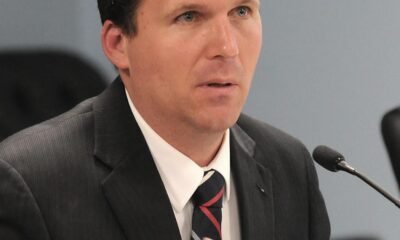Politics
Ukraine Allies Explore Potential Paths to a Cease-Fire Solution

Concerns are rising among Ukraine’s allies as discussions emerge over the potential conclusion of the conflict with Russia. Some Western capitals worry that dialogue around a cease-fire may pressure Kyiv into an early settlement.
Recent strategic conversations among officials, who spoke on the condition of anonymity, indicate a serious examination of negotiation pathways to end hostilities in the upcoming year. However, they emphasized that the decision to engage in talks rests entirely with President Volodymyr Zelenskyy, who remains steadfast against relinquishing territory to Russia.
The conflict shows limited signs of resolution, especially as winter approaches. This stalemate has prompted allied officials to consider diplomatic approaches to potentially break the deadlock.
While Kyiv’s tactical move into the Kursk region initially altered perceptions of a stagnant war, dislodging Russian forces from occupied territories appears unlikely soon. Although Moscow has struggled to advance, its missile assaults have severely damaged Ukraine’s energy infrastructure, raising alarm about the nation’s ability to endure the winter.
Zelenskyy is set to advocate for NATO and EU membership, alongside economic and security agreements and advanced weapon supplies, in a meeting with U.S. President Joe Biden later this month during the UN General Assembly. He also aims to brief prominent presidential candidates on his strategy.
A potential negotiation to conclude the fighting entails addressing a crucial dilemma: how to safeguard Ukraine from future Russian aggression while assuring allies they won’t be drawn into direct conflict. This complex situation contributes to the hesitance of several allies regarding the provision of long-range weapons to Ukraine.
Historical context, specifically the Minsk Accords post-Crimea annexation, adds further friction to the prospect of negotiations. Ukrainian leaders recall these discussions as fraught with pitfalls, fearing that any cease-fire could merely afford Russia time to regroup.
Concerns linger regarding Putin’s intentions following any agreement. A European defense official noted that a deal could embolden Russia, making it politically challenging for Zelenskyy to agree to terms involving territory loss, especially with Putin’s ambitions unchanged.
Some allies speculate that the period between the upcoming U.S. election and the inauguration may present an opportunity for the outgoing administration to navigate negotiations. However, uncertainty looms about continued military and financial support post-election, particularly if far-right factions gain influence in Europe.
Amidst this backdrop, discussions continue within Western governments, revealing internal divisions regarding Ukraine’s approach. One faction supports pursuing dialogue with Russia, citing the risk of escalation, while others insist on ramping up arms supplies.
Ukrainian sentiment favors maintaining territorial integrity, as highlighted by a recent poll indicating that 55 percent oppose territorial concessions. However, support increases to 38 percent for giving up land if it secures NATO and EU membership.
While discussions on future strategies continue, the urgent priority remains restoring Ukraine’s energy capacity before winter and countering Russian advances in the critical Donetsk region.


















